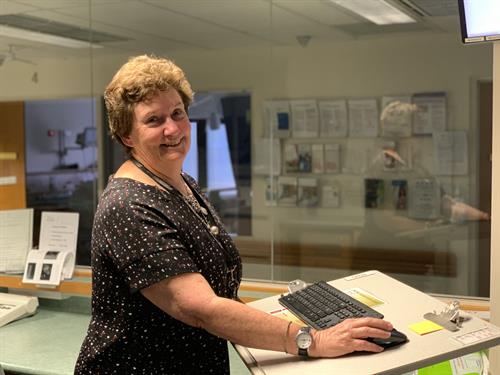Nursing hearts back to health: Lyn Smith

It’s five years since The Wesley’s Cardiac Service performed their first transcatheter aortic valve replacement (TAVR), ushering in a new era in heart care for patients suffering from severe aortic stenosis in Queensland. Since 2015, the multidisciplinary team have performed more than 300 cases, and TAVR Co-ordinator Lyn Smith has been there for every patient along the way:
How did your nursing career begin?
Many years ago I completed my general training at the RBWH, two years post grad before completing my midwifery, marrying and moving to PNG. I started at The Wesley in 1996 after completing a re-entry course as I had been out of nursing for about 12 years. Starting in 3B (now 4E) – our cardiac ward, I was exposed to a strong team approach to nursing care. To this day this culture remains within that team delivering exceptional patient-centred care. I continued in other rewarding positions in CCU, cardiac rehab and 2E. In 2010 I undertook a clinical education role which involved graduate recruitment. I consider myself privileged to still to see a lot of these grad nurses at The Wesley. At this time I completed a Graduate Certificate in Leadership and Management. A few years later I was offered a position as a medication safety nurse with UCH Pharmacy. I moved in to the Cardiac Care Coordinator role which encompassed TAVR co-ordination in it’s early procedural days, developing now into a full-time role.
What is your role as TAVR Co-ordinator?
The role is ever evolving and growing constantly which is why it is so rewarding. My primary role is in supporting the patient and their support framework through the co-ordination of their initial contact with us, their assessment phase, their procedural stay and their follow up for the 12 months post. TAVR procedures come under a growing structural heart field, with us now seeing percutaneous procedures for mitral and soon tricuspid valves. It also encompasses involvement with our Visiting Medical Practitioners and their administrative staff, our prosthetic valve suppliers, allied health and crucial support from I-MED radiology and GenesisCare Testing centres. I could not do it without the nursing teams I am involved with.
I often still get phone calls and photos years down the track, with former patients climbing the Great Wall of China or going back to their Red Hat activities, and I stay in touch with their families. I’m lucky the position allows that to happen, and to be part of these patient’s lives. Having a contact point helps allay a lot of fears – things that you and I take for granted. Otherwise they may have been readmitted or not improve because of the angst that is there.
Why does this specialty area of nursing appeal to you?
I find the challenges and the things that come out of the blue interesting; having to think outside the box and problem solve more than some structured specialties. These patients have quite complex issues so it is important to remember this is more than the valve procedure. The co-ordination of the different disciplines within the team: cardiologists, vascular surgeons, anaesthetists, interventional cardiologists, cardiac surgeons and the multidisciplinary nursing teams often pushes me outside of my comfort zone. The expertise and support of our nurses from procedural services, 4E, 2E and 3M is second to none. It’s so important to recognise the outcome of these procedures is not achievable by an individual, but must be a real team effort.
What is your relationship with our cardiac patients?
With the nature of the current approvals for TAVR procedures, a significant number of our patients are over 80, high risk and often anxious. We take a holistic view of the patients and their families and emphasise the importance of conversation and communication with them. It doesn’t matter what they decide or who they go to, as long as they understand the outcomes if they do or don’t go ahead with it. We support them with whichever decision they make. The Cairns and more regional patients always come with a different look at life… the resilience in them is something to see - an 86 year old that can get to Brisbane by themselves, their attitude is amazing and humbling.
What makes the Structural Heart Program at The Wesley unique?
One of the unique things about this program is from the outset the doctors have supported a hybrid model in their delivery of care. Involved are Cardiac Surgeons, Vascular Surgeons, Cardiac Anaesthetists and specialist Imaging Cardiologists and Interventional Cardiologists. Procedural days are bigger than Ben Herr often with four or five doctors (for good reason), so if something does become a challenge, you already have that expertise in the room.
The technology and expertise of our medical and nursing teams is ever-evolving, producing above average outcomes to our patients. Through a true team approach, the ownership of these outcomes for our patients and stakeholders is encouraged. Increasingly, I hope to see us more involved in research, be it medically, nursing or allied health.... It makes us better people who provide better care.
Find out more about The Wesley's Structural Heart Disease Program and TAVR.














